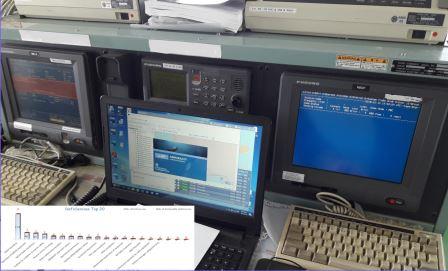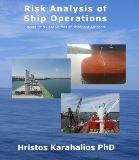GMDSS Deficiencies
What a PSC officer will check
Most radio-related PSC deficiencies in Paris MOU are related to logbook entries. However, operation of GMDSS or installation of MF/HF appears to be the most frequent detainable deficiencies. Usually, some basic questions during a PSC (or a Flag) inspection will include:

- Is the fitted equipment complying with the Record of Equipment?
- Are MMSI and other radio/EPIRB codes programmed and conform to the ship's documents?
- Are ship's operators able to use the GMDSS equipment?
- Is the required GMDSS INMARSAT installation capable of transmitting and receiving distress and safety alerts and traffic?
- Is the condition of the radio reserve source of energy (including the charger unit) satisfactory?
After reviewing several valuable guidelines (from class, PSC, SOLAS etc.) we compiled a detailed inspection checklist that you can find it here:
Ship sources of energy
- Verify that a continuous supply of electrical power, within equipment tolerances, is provided to all GMDSS equipment that could be affected by normal variations and interruptions of ship's power.
- When the reserve source of energy consists of batteries, equipment must be provided for automatically recharging them to minimum required capacity is not more than 10 hours.
- When the reserve source of energy consists of batteries, the battery capacity must be checked at intervals not exceeding 12 months. If not completed within the past 12 months, this must be done during inspection.
- Storage batteries provided as a reserve source of energy must be installed following applicable electrical codes and good engineering practice. They must be protected from adverse weather and physical damage. They must be readily accessible for maintenance and replacement.
- Main source of energy is available
- Emergency generator fitted and functional
- The crew can operate the MF/HF radio installation using both AC and DC power.
Radio Installations
- Permanently installed lighting sufficient to illuminate the operating controls of the radio installation and powered from a source independent of the ship's main and emergency power sources must be provided.
- Radiotelephone Station Clock is mounted near the operating position
- A spare assembled antenna for MF/HF equipment is onboard.
- Radio installation is marked with call sign, ship station identity, and other applicable codes.
- Visual inspection made of all MF/HF, VHF, INMARSAT, GPS antennas and coaxial feeders for satisfactory placement (including consideration of any possible interference)
- Checked that the MF/HF transmitting antennas are protected against being touched accidentally.
VHF Operation
- Radio officer can do a DSC test call
- Bridge officer can do a DSC individual call
- The transmitter power output must be between 6 and 25 watts
- DSC procedures are posted
- Operator’s manual is available
SART
- Self-test capability is required
- for satisfactory functional test using onboard 9 GHz radar.
- satisfactory stowage
- operating instructions are posted
- sufficient battery capacity
- clear markings with ship's call sign.
GMDSS VHF-FM Handheld Radios
- Battery expiration date to be marked on equipment
- Must be an additional battery to be used for testing purposes
- Satisfactory functional test
- Satisfactory stowage/availability
- Operating instructions
- The primary battery seals have not been broken
- Clear markings with ship's call sign.
Maritime Safety Information receiver
- The vessel must be capable of receiving MSI information in all areas in which the ship operates.
- Checked for correct operation by monitoring incoming messages or inspecting recent hard copy.
- Performed test run of the self-test program, if provided.
EGC Receiver
- Correct operation can be verified by checking incoming messages or inspecting recent hard copy.
- Performed test run of the self-test program, if provided.
HF Receiver Checklist
- Checked for correct use by monitoring incoming messages or inspecting recent hard copy.
- Performed test run of the self-test program, if provided.
406 MHz EPIRB
- The battery date must not be expired
- Must have a self-test capability
- Not any visual defects.
- Evidence of self-test routine.
- EPIRB ID and other information (include call sign and MMSI of the ship) is marked on the equipment externally
- Valid battery expiry date(s)
- Valid hydrostatic release(s) expiration dates(s)
- Posted beacon operating instructions
INMARSAT Ship Earth Station(s)
- Checked that equipment operates from the main, emergency (if provided), and reserve sources of energy.
- Where an uninterrupted supply of information from the ship's navigational or other equipment is required, ensure that such information remains available in the event of failure of the ship's main or emergency source of electrical power.
- Checked the distress function using an approved test procedure where possible.

